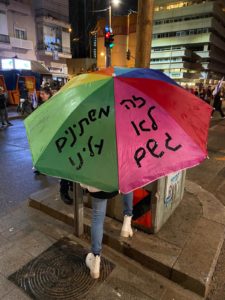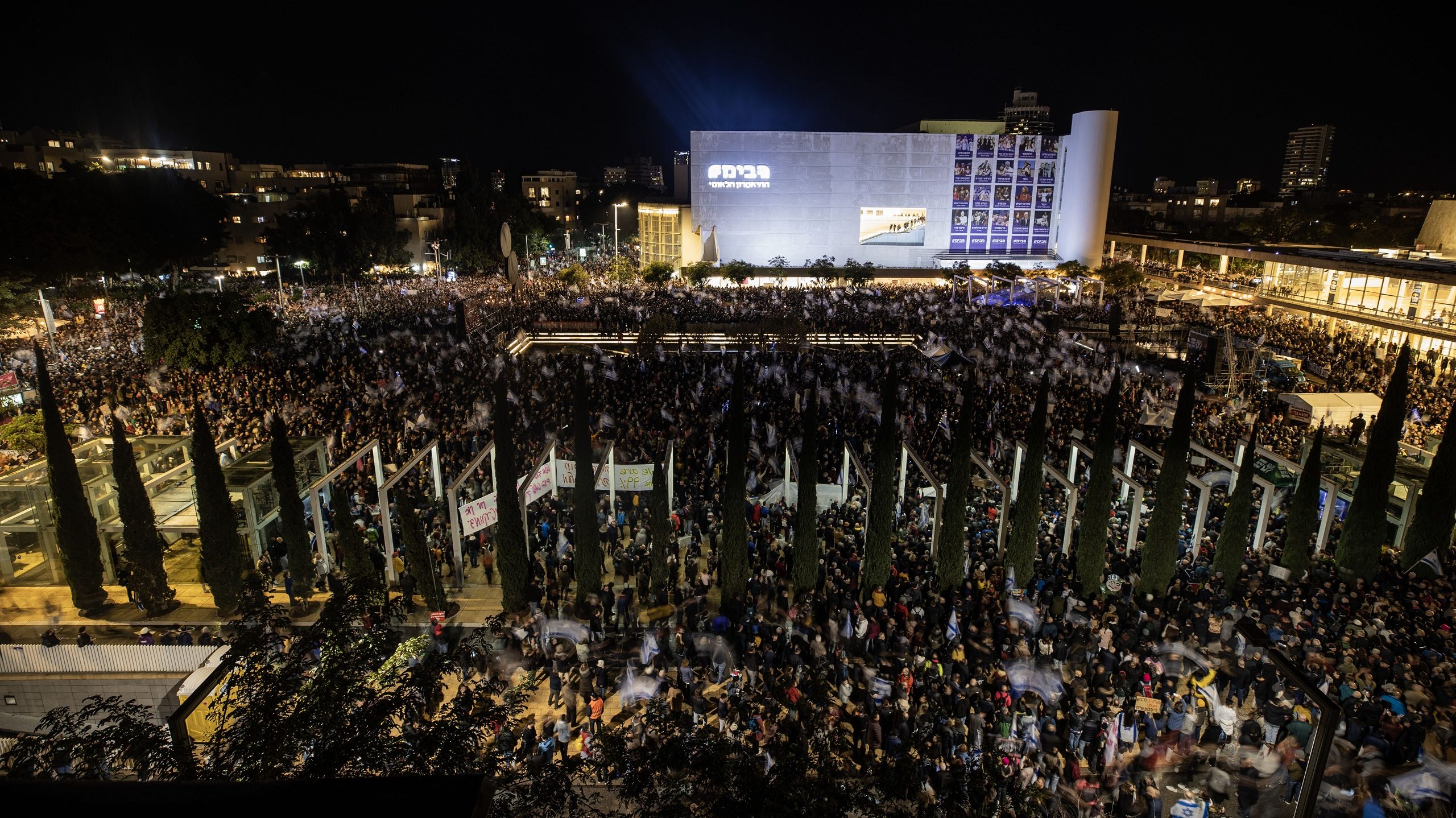Protest Against Israel’s Controversial Judicial Reforms Needs To Cross Political Blocs, Expert Says
About 80,000 Israelis gathered in Tel Aviv to demonstrate against the new right-wing government’s plans to make sweeping changes in the judicial system and elsewhere
An estimated 80,000 Israelis took to the streets of Tel Aviv on a rainy Saturday evening to protest government plans to make sweeping reforms in the judicial system.
Critics of the plan claim the changes will undermine Israeli democracy by crippling the Supreme Court and giving limitless power to the government.
Supporters say Israel’s Supreme Court has accumulated too much power in recent decades and inserts itself into political decisions where it should not.
The reforms include giving Israel’s parliament, the Knesset, the ability to override Supreme Court rulings. In addition, politicians will have greater influence in the appointment of Supreme Court judges, and legal advisers to ministries will be allowed to be political appointments.
The massive protest was the first test for the newly sworn-in government led by Prime Minister Binyamin Netanyahu.

The umbrella of a protester at the January 14, 2023 Tel Aviv demonstration against the current government’s proposed judicial changes reads: “This isn’t rain, we are changing.” (Yael Zamir/The Media Line)
The current Netanyahu government has vowed major reforms in various arenas. The judicial reform is almost the raison d’etre of the coalition and was subject to debate as early as during the election campaign.
Netanyahu’s opponents believe that his motives for the reform have to do with his legal woes. The Israeli premier is on trial for several charges of corruption. Should the planned reforms be adopted in their entirety, Netanyahu could easily influence the outcome of his trial by the appointment of a more sympathetic attorney general, and also by limiting his or her authority.
Netanyahu has denied any wrong-doing and also denies the reforms are personally motivated.
“Several months ago there was a huge demonstration, the mother of all demonstrations. Millions of people went into the streets in order to vote in the elections. One of the main topics that they voted on was reforming the judicial system,” said Netanyahu at the opening of the weekly cabinet meeting Sunday, referring to the November election which brought him back to power. “We will make the necessary changes in the judicial system, prudently and responsibly. We are going to change the system, to save it and not destroy it.”
Demonstrations also were held in Jerusalem and Haifa.
There have been many protests against Netanyahu himself since suspicions against him were made public. Although Israeli law allows him to serve as premier while on trial, many in the public demonstrated against his rule. Israel’s five consecutive elections since 2019 were all focused on Netanyahu. Those protests, often held in front his official residence in Jerusalem, were largely associated with the left.
The last election enabled Netanyahu to form a fully right-wing government giving him freedom to carry out widespread reforms. With a solid majority in the Knesset there is not much stopping him.
For many of his opponents, demonstrations are the only option.
The contentious reforms are not only opposed by the anti-Netanyahu bloc.
While acknowledging the need for change, politicians from the right, including long-time members of Netanyahu’s own Likud party, have voiced their opposition to the blanket changes Netanyahu and his allies are promoting.
“The question is how to make this a protest that crosses political blocs,” said Dr. Moti Gigi, a sociologist and head of the Communications Department at Sapir Academic College. “When there is a claim that the democratic principles of the country are being attacked, this is not a matter of left or right.”
Gigi estimates the majority of demonstrators on Saturday night were from the center-left bloc.
“We are not at that point in time yet when it becomes a matter for both blocs, but this is certainly an issue needs to be on everyone’s minds,” he added.
The reform in the appointment of Supreme Court judges has been discussed for years. Criticized for not representing the many fragments of Israeli society, there are people who may not demonstrate because they feel that there is a need for these reforms.
“The Supreme Court must examine itself. There is importance of representation. Justice needs to be both done and seen,” said Gigi. “The court needs to more adequately represent society.”
Since its inception, judges of the Supreme Court were considered to come from the country’s intellectual elite, only representing a certain part of society. The protest in its current format, fueled by former justices and attorney generals, is perhaps excluding vital participants in order for it to succeed.
“Our aim to get to as many people, in the right, in the center, both religious and secular people,” said one of the organizers of the protest in Jerusalem from “Protecting our shared home,” a new organization established just recently. “It is absolutely necessary for the success of our struggle that it will not be a homogenous struggle, only by left and secular Israelis.”
For years, the perception was that the Supreme Court only dealt with issues regarding the Israeli-Palestinian conflict, the political arena and military issues. But in recent decades, as the court began dealing with moral issues, the equilibrium between church and state and issues of equality and discrimination, the court and many of its rulings became identified with the left.
Fighting to save it is therefore perceived as a battle of those on the left of the political spectrum.
“The messages of the campaign against the government are not effective yet and are aimed to the leftist, liberal political camp. It is an in-house campaign and will not cause the government to sweat just yet,” said Professor Udi Lebel of the School of Communication at Bar-Ilan University.
The right-wing took an antagonist position toward the courts, criticizing its legislative activism. Coupled with that was an increasing belief that the court did not allow governments, any government, to implement policy.
“Having right-wingers cross over to support the demonstrations will be a major challenge,” said Lebel. “The political identity of these camps is partly, but distinctly, defined by how they feel about the courts.”
Speaking on condition of anonymity, the organizer of the Jerusalem demonstration estimated some 3,000-5,000 people attended the protest. According to participants, there were many protesters wearing religious skullcaps at the event.
“We are trying to unite over one concrete message which is to fight against the attempt to change the judicial system,” the organizer said. “We believe there are many people in the right and center together with religious people that agree to this message.”
Netanyahu has indicated the fierce criticism would not stop him from pushing forward with the reforms. However, he is not deaf to the public outcry. In 2011, as social justice protests filled the streets, Netanyahu made several changes in the economy in response. Very active on social media, the 73-year-old veteran politician is attuned to public sentiment.
However, it is not yet a threat to his political survival.

Protest at Paris Square in Jerusalem on January 14, 2023 against changes proposed by Israel’s new right-wing government led by Prime Minister Binyamin Netanyahu. (Steven Ganot/The Media Line)
Yael Zamir, a 51-year-old resident of Jerusalem, demonstrated in Tel Aviv this weekend. In the past, she demonstrated against Netanyahu and felt compelled to do so again.
“Public opinion has power,” she said. “When the government will realize that their attempts to legislate laws that make Israel become a dictatorship will not go down quietly, they will need to take a step back. The public voted for a right-wing government, that’s fine. But this has nothing to do with left or right, this is about our democracy.”
The presence of ultra-right-wing members in the coalition could sway its own voters against the reforms. Members of the Netanyahu government have spoken openly against the LGBTQ community and against equality for women. These are issues the courts have been critical in defending. But these are issues that hit close to home for everyone.
“Once they will realize that the weakening of the judicial system will not lead to policy changes, but rather to identity changes and a promotion of a more religious and oppressive state toward women and the LGBTQ community, this may be a protest they will lend a hand to,” said Lebel.
Realizing the public pressure and its potential to spread, some members of the coalition have said they are open for discussion on the reforms, including Netanyahu and his justice minister, Yair Levin.
“We are seeing an initial crack,” said Gigi. “The more the protests continue, there will be more cracks. Decision-makers will not be able to ignore the protests if they continue to grow.”
This is what the protesters are looking for.
“As long as the message is geared to the left, the government can be very calm,” said Lebel. “The government will move, only when the tide turns within its base of voters.”
Organizers plan to protest again next Saturday.
“There is a huge thirst in the public for demonstration,” said the organizer of the Jerusalem protest. “We feel that there is a vacuum and there are a lot of people just waiting for a framework to go out and demonstrate.”
Video: Felice Friedson and Dario Sanchez, with Sara Miller

